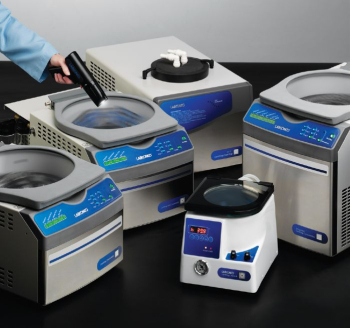How to Select a Centrifugal Concentrator
 With so many centrifugal concentrator models and accessories to choose from, it can be very confusing to select the best system for your sample preparation needs. Choosing the correct model and components will help ensure your sample’s integrity and lengthen your concentrator’s functional life.
With so many centrifugal concentrator models and accessories to choose from, it can be very confusing to select the best system for your sample preparation needs. Choosing the correct model and components will help ensure your sample’s integrity and lengthen your concentrator’s functional life.
Although in many cases more than one concentrator model or accessory would be sufficient for the job, several important factors about your samples will dictate the most appropriate model for your application. You may also want to consider not only what your current concentrator needs are, but also what other applications or sample types you might use in the future. Since centrifugal concentrators cannot be significantly modified after purchase, you can make a smarter choice and protect your lab equipment investment if you also plan for any foreseeable future uses that you can predict.
It’s important to know the following in order to select the best centrifugal concentrator for your application:
1. Solutions being concentrated and any potential solutions that may be used
- Corrosivity – Determines necessity of Acid Resistant CentriVap
- Compatibility with Acrylic – Determines necessity of CentriVap with glass lid
- Toxicity – Determines if fume hood ventilation is needed (closed system vs. open system)
- Volatility – Determines type of vacuum pump needed,
- Freezing point – Temperature of the Cold Trap required and ability to close the system
2. Sample volumes, sample tube sizes and the number of samples that will be concentrated simultaneously
- Small volume and small number: Micro IR can accommodate up to 24- 1.5 ml tubes or up to 8- 25 ml tubes.
- Small volume up to 250 ml: Aside from the Micro IR, all other CentriVaps accommodate up to 132- 1.5 ml tubes up to 4- 250 ml flask and many sizes of samples and sample tube quantities in between.
3. Maximum temperature to which sample can be exposed
- If the sample temperature needs to be < 30ºC at all times: Refrigerated CentriVap is needed.
4. Will CentriVap system be used for lyophilization as well as concentration?
- For lyophilization: A Cold Trap with a temperature that is at least 20ºC below the sample freezing point must be used.
For a quick selection guide, try the Scout™ Laboratory Equipment Selector.
| chevron_left | How can a Filtered Fume Hood free up my lab's budget? | Articles | Understanding High Performance Fume Hoods | chevron_right |






